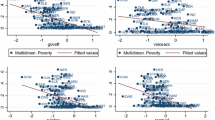Abstract
In this paper I critically engage with Hennie Lötter’s impressive book, Poverty, Ethics and Justice. I discuss his conception of poverty, and offer an interpretation of his claim that poverty is a uniquely human scourge. I exam the various harms of poverty that Lötter discusses. I consider two reasons that he offers for why we have a moral duty to end poverty, and I argue that the reason based on what we can justify to others if we take their human dignity seriously is most compelling. Finally, I argue that Lötter overemphasizes of the moral importance of aid and downplays in the importance of the justice of institutional and structural change. I close by considering the prospects for social equality given our experience of capitalist development as a means for poverty eradication. I consider the moral importance of limits to the achievement of robust equality.
Similar content being viewed by others
References
Chang, Ha-Joon. 2002. Kicking away the ladder: Development strategy in historical perspective. London: Anthem Press.
Cohen, G.A. 2001. Karl Marx’s theory of history: A defence, expanded ed. Princeton: Princeton University Press.
Forst, Rainer. 2012. The right to justification. New York: Columbia University Press.
Lötter, Hennie. 2011. Poverty, ethics and justice. Cardiff: University of Wales Press.
Marx, Karl. 1846/2000. The German ideology. In Karl Marx: Selected Writings, 2nd edn, ed. David McLellan, 175–208. Oxford: Oxford University Press.
Moellendorf, Darrel. 2009. Global inequality matters. New York: Palgrave Macmillan.
Scanlon, T.M. 1998. What we owe to each other. Cambridge, MA: Harvard University Press.
Acknowledgments
I would like to thank Thad Metz for the invitation to write and to present this paper at the University of Johannesburg workshop on Hennie Lötter’s book. I also wish to thank the participants of the conference for discussing these ideas with me. And most especially I’d like to thank Hennie Lötter for the fine book that stimulated these thoughts and for his comments on this paper.
Author information
Authors and Affiliations
Corresponding author
Rights and permissions
About this article
Cite this article
Moellendorf, D. Anti-Poverty, Development, and the Limits of Progress. Res Publica 22, 317–325 (2016). https://doi.org/10.1007/s11158-016-9329-y
Published:
Issue Date:
DOI: https://doi.org/10.1007/s11158-016-9329-y




